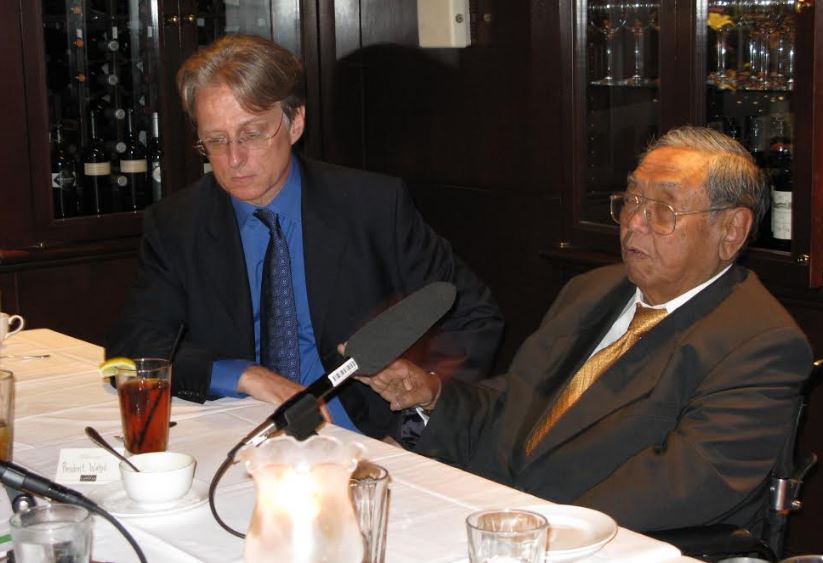Dr.Gerstenfeld’s interview with C. Holland Taylor about the late Indonesian President Wahid’s relations with Israel was first published in Israel National News. It is republished here with the author’s consent.
The Late Indonesian President Wahid’s multiple Ties with Israel and Jews
Interview of C. Holland Taylor
 “His Excellency Kyai Haji Abdurahhaman Wahid served as president of Indonesia from 1999-2001. He is the only Indonesian president who visited Israel and did so a number of times. President Wahid was deeply aware of the cultural, historical, intellectual and spiritual dimensions of Judaism, as well as the intimate religious and linguistic connections between Judaism/Islam and Hebrew/Arabic.
“His Excellency Kyai Haji Abdurahhaman Wahid served as president of Indonesia from 1999-2001. He is the only Indonesian president who visited Israel and did so a number of times. President Wahid was deeply aware of the cultural, historical, intellectual and spiritual dimensions of Judaism, as well as the intimate religious and linguistic connections between Judaism/Islam and Hebrew/Arabic.
“President Wahid — popularly known as “Gus Dur”—was a humanitarian and viewed others primarily through the lens of love, compassion and respect. He regarded Jews and Judaism as an integral and profoundly legitimate “thread” within the fabric of human existence, whose contributions to humanity have been immense. That’s why he agreed to sponsor the 2007 Bali Holocaust Conference with our friends from the Simon Wiesenthal Center and accepted the organization’s Medal of Valor at an award ceremony the following year in Los Angeles.
C. Holland Taylor is a retired American businessman who has lived in Indonesia since 1999 and was a close friend of President Wahid.
“Gus Dur had a number of Jewish friends. One of these was an Iraqi Jew named Ramin, with whom he worked at an import/export business in downtown Baghdad during the 1960s. Gus Dur studied the Kabbalah with Ramin in some depth. He also studied with a Sunni Sufi Shaykh who was later tortured and murdered by the Baathist regime in Bagdad. Together with Ramin, Gus Dur witnessed the public execution of nine Iraqi Jews who had been falsely accused of spying for Israel.
“From Gus Dur’s perspective, the treatment of the nine Iraqi Jews and the Sufi Shaykh was identical. They were all victims of extreme brutality and injustice. In that context, ethnicity and religion were irrelevant to Gus Dur, except insofar as these made the Sunni Shaykh and Iraqi Jews targets of a vicious regime. To Gus Dur, their humanity and suffering were paramount.
“After his stay in Iraq during the 1960s, Gus Dur’s next intensive engagement with Jews and Judaism — beyond his extensive reading of Jewish literature — most likely occurred during his term as chairman of the Nahdlatul Ulama (NU) Executive Board from 1984 to 1999. This Indonesian charitable organization is the world’s largest Muslim movement, with over 50 million members.
“During his chairmanship of NU Gus Dur traveled extensively and developed many international contacts, including with the American Jewish Committee. Following his term as Indonesia’s fourth president, Gus Dur maintained these contacts and continued to visit both the United States and Israel.
“He regarded Israel as having a legitimate right to exist, and believed that Jews have a right to dwell in their historic homeland. Gus Dur said once to me: ‘You know why the conflict between Israel and its neighbors has never found a peaceful resolution? It’s because Arabs refuse to accept Israel’s right to exist.’
“During his first week in office as President of Indonesia, Gus Dur publicly called for establishing diplomatic relations with Israel. He said: ‘Indonesia has diplomatic relations with China, a communist — and thus atheist — country. Why shouldn’t we have normal relations with Israel, whose people and government believe in God, as we do?’
“Gus Dur believed that the demonization of Jews, Judaism and Israel were manifestations of a profound psychological and emotional illness that afflicts a large percentage of human beings, and works to the detriment of humanity at large. He wished to normalize relations with Israel through his straightforward words and actions.
“I do not know the full range of Gus Dur’s contacts with Israel, although they were extensive. For example, he received an honorary award from Netanya College, where he served on an advisory board with Mikhail Gorbachev and prominent Israeli figures. He also had a close relationship with Prince Hassan bin Talal, King Hussein of Jordan’s younger brother. This relationship was connected to certain positive dynamics between Israel and Jordan.
“Before his death, Gus Dur said to me: ‘The fact that we are friends with Jews and Israel does not mean that we wish to take Israel’s side against its neighbors. We are also friends to the Palestinians and Arabs. And the fact that we are friends with Shimon Peres does not mean that we should be equally close to any and all Israeli politicians. We defend Jews and Israel as a matter of principle, on the basis of our shared humanity, but we should never allow ourselves to be used inappropriately by anyone in Israel who might wish to do so.’
“President Wahid was a towering figure, widely regarded as a saint. This strongly colored the majority of Indonesians’ views and acceptance of his conduct in regard to Jews and Israel. Nowadays the spiritual wing of the NU and the related political party PKB generally recollect and accept President Wahid’s attitudes toward Israel. A number of leading figures consciously share his attitude. They view people of other faiths in light of our common humanity; have no animosity towards Jews; and regard the conflict between Israel and its neighbors as territorial in origin, unrelated to the essential teachings of religion, except insofar as either side chooses to ignore these universal principles, which all religions share in common.”

